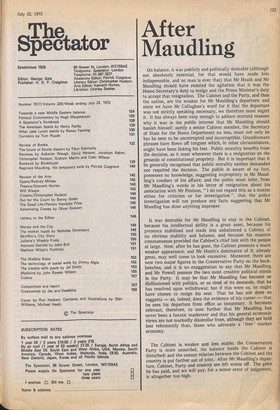After Maudling
On balance, it was publicly and politically desirable (although not absolutely essential, tor that would have made him indispensable, and no man is ever that) that Mr Heath and Mr Maudling should have resisted the agitation that it was the Home Secretary's duty to resign and the Prime Minister's duty to accept that resignation. The Cabinet and the Party, and thus the nation, are the weaker for Mr Maulding's departure; and since we have Mr Callaghan's word for it that the departure was not strictly speaking necessary, we therefore must regret it. It has always been easy enough to adduce orotund reasons why it was in the public interest that Mr Maulding should banish himself: surely a senior Cabinet member, the Secretary of State for the Home Department no less, must not only be but be seen to be uncorrupted and incorruptible. Grandisonant phrases have flown off tongues which, in other circumstances, might have been licking his feet. Public morality benefits from the decision, as it must whenever there is a resignation on the grounds of constitutional propriety. But it is important that it be generally recognised that public morality neither demanded nor required the decision. The public is aware of no fact, possesses no knowledge, suggesting impropriety in Mr Maudling's conduct of his affairs; and the public must infer, from Mr Maudling's words in his letter of resignation about his association with Mr Poulson, "I do not regard this as a matter either for criticism or for investigation ", that the police investigation will not produce any facts suggesting that Mr Maudlng has done anything improper.
It was desirable for Mr Maudling to stay in the Cabinet, because his intellectual ability is a great asset, because his presence stabilised and made less unbalanced a Cabinet of no obvious stability and balance, and because his massive commonsense provided the Cabinet's chief link with the people at large. Now, after he has gone, the Cabinet presents a much weaker appearance; and Mr Heath's dominance of it, already great, may well come to look excessive. Moreover, there are now two major figures in the Conservative Party on the backbenches, and it is no exaggeration to say that Mr Maudling and Mr Powell possess the two most creative political minds In the Party. It may be that Mr Maudling has become so disillusioned with politics, or so tired of its demands, that he has resolved upon withdrawal; but if this were so, he might have chosen to resign his seat. That he has not done so suggests — as, indeed, does the evidence of his career — that he sees his departure from office as temporary. It becomes relevant, therefore, to note further that Mr Maudling has never been a fanatic marketeer and that his general economic views are not markedly dissimilar from, although they are held less vehemently than, those who advocate a ` free ' market economy.
The Cabinet is weaker and less stable; the Conservative Party is more unsettled; the balance inside the Cabinet is disturbed; and the uneasy relation between the Cabinet and the country is put further out of joint. After Mr Maudling's departure, Cabinet, Party and country are left worse off. The price he has paid, and we will pay, for a minor error of judgement, is altogether too high.










































 Previous page
Previous page